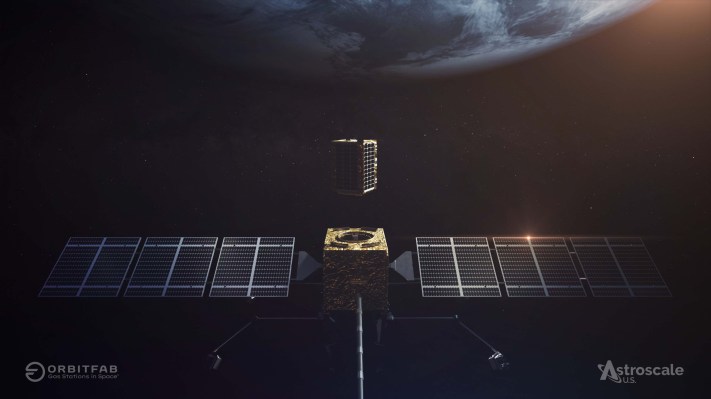Orbit Fab, a company that wants to build a network of refueling stations in orbit, closed a $28.5 million Series A to launch more fuel delivery and infrastructure missions.
The Colorado-based startup has developed a refueling port called the Rapidly Attachable Fluid Transfer Interface (RAFTI), which can be integrated onto satellites and orbital servicing vehicles. Orbit Fab wants to launch on-orbit fuel tankers (which the company sometimes analogizes to gas stations) that can dock with any spacecraft outfitted with a RAFTI port.
Without a way to refuel satellites in space, any given spacecraft’s useful life is limited by how much fuel it’s carrying at launch. This can make a satellite heavier and more expensive, and each maneuver costly. Orbit Fab says refueling could enable more extensive satellite servicing missions, rendezvous and proximity operations, in-space assembly, and other spacecraft maneuvers that could demand longer life spans, while driving the overall cost of operating a satellite down.
Last August, Orbit Fab said it would deliver up to 100 kilograms of hydrazine to satellites in GEO for $20 million, starting in 2025.
The company already has four launches booked over the next three years, including three missions for the U.S. Department of Defense. One of those missions, scheduled for early 2025, will see Orbit Fab’s RAFTI port integrated on military satellites so that they can be refueled by on-orbit hydrazine tankers. Overall, Orbit Fab has closed over $21 million in DOD contracts.
Orbit Fab is also starting to close on commercial customers: The company inked an agreement with Astroscale to replenish its orbital service vehicles in geostationary orbit (GEO).
In addition to the Series A, which Orbit Fab said was an up round, the company announced that it had doubled its team to 60 people over the past year and plans to hire at least another 25 this year.
The up round was led by 8090 Industries, with additional investments by Stride Capital, Industrious Ventures, Lockheed Martin Ventures, Tribe Capital, Good Growth Capital, and Massive Capital Partners.
